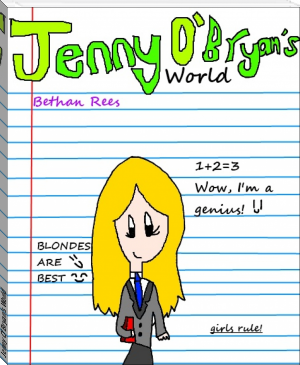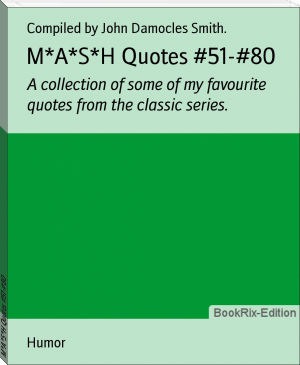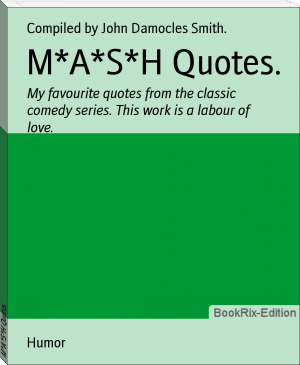The History and Records of the Elephant Club by Doesticks and Underhill (android based ebook reader TXT) 📗

- Author: Doesticks and Underhill
Book online «The History and Records of the Elephant Club by Doesticks and Underhill (android based ebook reader TXT) 📗». Author Doesticks and Underhill
"'Vell, I didn't sell 'em for sassengers.'
"'What did you sell them for?'
"'I didn't sell 'em.'
"'How did you dispose of them?'
"'Is old Keene varden of the penitentiary now?'
"'Tell me, now, what you did with the dogs.'
"'I took 'em to the dog pound.'
"'What did you do with them there?'
"'Vy, doesn't they muzzle cats the same as dogs?'
"'Look here, Thomas, you must answer my question without equivocation. I want to understand the details of this dog-business. What did you do with them at the dog-pound?'
"'For hevery dog as ve takes to the pound ve gets an 'arf a slum.'
"'Then it seems you caught your dogs in New Jersey, brought them to the New York dog-pound, and claimed for your philanthropic exertions the reward of a half a dollar, offered by ordinance for every dog caught within the limits of New York?'
"'Vell, if you'd been born into the perwession, you couldn't have understood its vays better.'[Pg 92]
"'You are a sweet subject, certainly.'
"'Des'say.'
"'Are you not ashamed of yourself, to be found lying drunk in door-ways?'
"'B'lieve so.'
"'Are you not certain you are?'
"'Prob'bly.'
"'Did you drink liquor to-night?'
"'P'r'aps.'
"'Where did you get it?'
"'Dun'no.'
"'What kind was it?'
"'I halvays 'ad a passion for gin.'
"'Was it gin you drank to-night?'
"'Des'say.'
"'Are you not sure that it was?'
"'Mebbee.'
"'How often do you drink?'
"'Honly ven I've got the blunt to pay. Dutchmen vont trust now.'
"'Did you have any money to-night?'
"'Likely.'
"'How did you get it?'
"''Oldin' an 'orse for a cove.'
"'How much did you get for that?'
"'A shillin.'[Pg 93]
"'With that you bought gin?'
"'Prob'bly.'
"'And got drunk?'
"'Poss'bly.'
"'Thomas, where do you live?'
"'Noveres, in p'tickler.'
"'Where do you eat?'
"'Vere the wittles is.'
"'Where do you sleep?'
"'Anyveres, so that the M.P.s can't nab me.'
"'You ought to be sent to Blackwell's Island as a vagrant.'
"'Des'say.'
"'You've been there, have you not?'
"'Mebbee.'
"'Don't you know whether you've been there or not?'
"'P'r'aps.'
"'Are you certain of anything?'
"'Dun'no.'
"'Now, Thomas,' said I, in conclusion, 'I am going to let you off this time, but I hope you will keep sober in the future. Now, here is a quarter for you, to pay for your lodging to-night.'
"Thomas, the non-committalist, accepted the silver.[Pg 94]
"I concluded to ask him one more question, in hopes to get a direct and positive answer.
"'Will you use that money to pay for a bed?' I asked.
"'Des'say,' said he, upon which I vamosed."
The Higholdboy raised himself from his official seat before the window, turned round, got on his knees in the chair, leaned his head on his hands and his arms on the chair-back, and whilst everybody was still and quiet, he called out, in a stentorian voice, "Order." The effect of this peremptory demand was to induce considerable disorder, as no one was willing to be regarded out of order, even by implication, without some foundation. Everybody talked and nobody listened, except Mr. Dropper, and it was not until Mr. Quackenbush had stuffed a ham sandwich down the throat of the Higholdboy, thrown a box of sardines at the head of Van Dam, tipped over the timid Boggs, and poured a lemonade down the throat of Johnny Cake, that they would consent to hear what he desired to say.
"Gentlemen," said Quackenbush, "that's a remarkably fine story, isn't it?"
"Des'say," said Spout.
"Werry like," responded Van Dam.[Pg 95]
"Mebbee," replied Johnny Cake.
"Likely," remarked Boggs, as he picked himself up, preparatory to letting himself down in three chairs.
Mr. Spout left his chair, and moved to that particular locality in the apartment where the bell-pull, leading to the bar below, was situated. He gave sundry pulls in accordance with the previously-arranged system of telegraphing, and in a few minutes they were answered by a young gentleman, with a tin waiter in his hands, on which were placed divers decoctions, which stand in better repute outside of total abstinence societies than inside. Each took his mixture until it came to Johnny Cake, when the Higholdboy passed over to him a mild beverage, called a port wine sangaree. Johnny refused to accept it, and announced that he was strict in his adherence to principle—that he never indulged in anything which could intoxicate. A lemonade he would indulge in sometimes, but a port wine sangaree—never—never—NEVER.
When Johnny Cake had finished his indignant repudiation of the port wine sangaree amid the cheering of his fellow members, Mr. James George Boggs arose. He mounted a chair, and made an effort to speak. He was greeted with loud applause.[Pg 96]
As soon as these manifestations had subsided, he said:
"Fellow-citizens (applause); I may say that it is with feelings of the most profound gratification (loud applause), that I meet, this evening, the members of the illustrious Elephant Club (continued applause), of which I am an unpretending and obscure member (renewed applause). Gentlemen, I do not like to appear as an apologist, and much less an apologist for my own shortcomings (loud and continued applause). Gentlemen, I protest against your unwarranted interference when I am trying to be funny (applause and cheers). I am a modest man, and I am unwilling to stand here to be fooled with (enthusiastic applause); Mr. Dropper, if you don't shut up your mouth, I'll knock your moustache down your throat (tremendous applause). Mr. Spout, you are the Higholdboy of this club, but I'll hit you with a brick if you don't keep better order. (Cries of "Order!" "Order!") If you'll stop your blasted noise, there will be no trouble about order. (Cries of "Go on!") Well, gentlemen, as I was saying that—that—that—where the devil did I leave off? (Applause and laughter.) There, you see that you have broken the thread of my remarks. (Cries of "Good!") Yes, it may be fun for you, but,[Pg 97] as the boy said to the frogs, it's death to me (laughter). No, I mean as the Death said to the boys, it's frogs to—(renewed laughter). Go to thunder! I am not going to make speeches to such a set a young rascals as you are." (More applause.)
As soon as order had restored itself, the Higholdboy ordered, at his own expense, a glass of apple-jack for Mr. Boggs, with the view of expressing, through it, his full and thorough appreciation of Boggs's oratory. Mr. Boggs accepted it. Inquiry was then made of Mr. Boggs as to what he had desired to say in his speech. He stated substantially, that, having been engaged in loafing about, and doing nothing, he had had no time to prepare a contribution for the entertainment of the club.
So completely had the eloquence of Mr. Boggs riveted the attention of the club, that they had hardly made a commencement in disposing of the beverages which had been ordered; Mr. Dropper proposed that, as Johnny Cake was not to be employed in drinking, he having ignored the proffered port wine sangaree, he should occupy their time by relating his experience. To this he expressed his willingness to accede. He stated, however, that he had been on a flying visit to Illinois since his initiation into the Elephantine order, and that he was consequently unable to furnish[Pg 98] them with any experience of an interesting nature, in New York. But some interesting incidents had occurred on a railroad train, which he had undertaken to note down, with the view of reading to the club.
Mr. Johnny Cake here produced a roll of manuscripts, which, after he had straightened up his collar, he proceeded to read. The manuscript read as follows:—
"I do not propose, now, to give you a glimpse of anything within the city. In fact, it is my intention to inflict upon you an extra-metropolitan scene, which I recently witnessed, and which, though funny, was not comfortable, and I don't care about experiencing it again."
The section of country to which your attention is called was flat—positively flat—comparatively stale, and superlatively unprofitable. It was a western prairie marsh, the home of gigantic frogs, the abiding place of water-snakes and musk-rats; where flourished in luxuriant profusion, bulrushes, water-cresses, pond-lilies, and such like amphibious and un-get-at-able vegetables. Through that particular locality a train of cars was not only seen, but heard going at 2'40" speed over a pile-bridge, made across a Michigan swamp, by driving black-oak logs end-wise into the mud. The people therein were covered with dust, as thickly as if each man had been[Pg 99] a locomoting Pompeii, each woman a perambulating Herculaneum, and some vagrant Vesuvius had been showering ashes on them all for a month. They were lying about loose in the cars, after the ordinary fashion of people on a tedious railway journey; curled up in some such ungraceful and uneasy positions as the tired beasts of a strolling menagerie probably assume in their cages during their forced marches across the country. To carry out the parallel, the conductor came along at irregular intervals, and with deliberate and premeditated malignity, stirred up the passengers, as if they were actually animals on exhibition, and he really was their keeper, and wanted to make them growl. And this conductor, in common with conductors in general, deserves notice for the diabolical ingenuity which he displayed in forcing from his helpless victims the greatest number of growls in a limited space of time.
The cars had just left the flourishing prairie city of Scraggville, which contains seven houses and a tavern, and a ten-acre lot for a church, in the centre of which the minister holds forth now from a cedar stump. At the tavern, dinner had been served up, and the conductor, according to the usual custom, had started the train as soon, without waiting for his passengers to eat anything, as the money was collected.[Pg 100] The population of our train, which exceeded that of the great city of Scraggville by about one hundred and seventy persons, had composed itself for a short nap, and the various individuals had settled as nearly into their old places as possible, when a man, remarkable for a particularly lofty shirt-collar, a wooden leg, and an unusual quantity of dust on the bridge of his nose, began to sing. He commenced that touching ballad, now so popular, "the affecting history of Vilikins and his Dinah." The pathos of his words, added to the unusual power of his voice, waked up his right-hand neighbor, before he had proceeded any further than to inform the listeners that,
"Vilikins vas a-valking"——
This neighbor who was so suddenly aroused, and who was distinguished by a steeple-crowned hat, did not appear to care where Vilikins was a-walking, or to take much interest in the particulars of the said walk, for he immediately turned on the other side, tied himself up in a worse knot than he was in before, and attempted to sleep again. He had in so doing shaken from the top of his mountainous hat about half a peck of cinders, directly into the mouth of the vocalist. The latter gentleman, however, seemed[Pg 101] nothing disconcerted by this unexpected pulverulent donation, but, removing those particles which most interfered with his vocal apparatus, he proceeded with his melody. This time he progressed as far as to state emphatically that,
"Vilikins vas a-valkin' in his garding one day,"
And was about to add the explanatory notes, that it was the "back garding," when his left-hand neighbor emerged from a condition of somnolency into a state of unusual wakefulness.
The most noticeable thing about this last named individual was the optical fact that he had but one eye. And as this solitary orb was partially filled with the dust which had accumulated therein, during a ten hours' nap in a rail-car, over a sandy road, with a headwind, it might be supposed that his facilities for visual observation were somewhat abridged. This did not prove, however, to be the case, for with a single glance of this encumbered optic, he seemed to take in the character of the singer, and to make up his mind instanter that he was a good fellow and a man to be acquainted with.
Acting promptly upon this extemporaneous opinion, he held out his hand with the remark:[Pg 102]
"I don't want to interfere with any arrangements you have made, stranger, but here's my hand, and my name's Wagstaff—let's be jolly."
The singer had by this time got to the chorus of his song, and although he took the extended hand, his only immediate reply to the observations of one-eyed Wagstaff, was "too ral li, too ral li, too ral li la," which he repeated with an extra shake on the last "la," before he condescended to answer. And even then his observation, though poetic, was not particularly coherent or relevant. It was couched in the following language.
"Jolly? yes, we'll be jolly. Old King Cole was a jolly old soul, and a jolly old soul was





Comments (0)